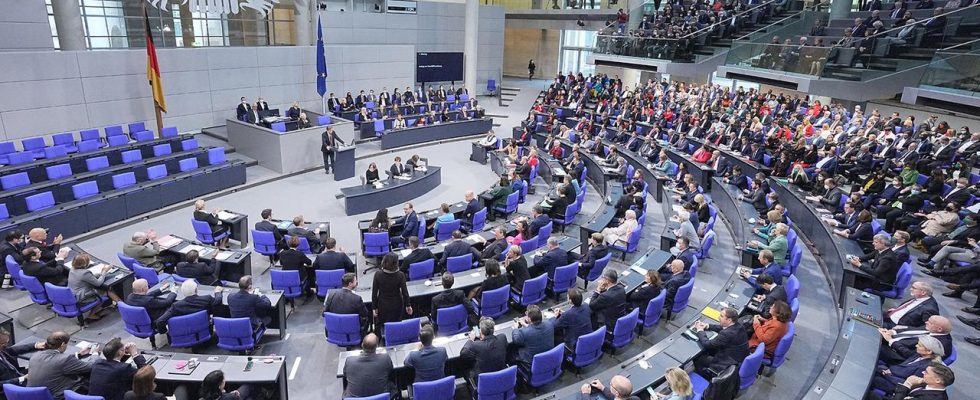The Bundestag is supposed to become smaller again as a result of the electoral law reform – but this is met with resistance from the Union and the Left Party. The latter even assumes that the traffic light has political goals. The Federal Constitutional Court is now negotiating.
“We are in Karlsruhe today before the Federal Constitutional Court because we unfortunately have to sue against the voting rights passed by the traffic light last year,” said CDU chairman Friedrich Merz before the start of the oral hearing before the Federal Constitutional Court in Karlsruhe. “The traffic light voting right violates the equal opportunities of the political parties in the German Bundestag in an almost gross manner.”
He is not the only one who appears in front of the press before the start of the negotiations. A large number of critics of the new voting law have arrived. Martin Schirdewan, co-leader of the Left Party, also wants the new electoral law to be overturned.
He and his party colleagues are of the opinion that the traffic light coalition is also pursuing a political goal – “namely, to get rid of unpleasant competition through the election, so to speak.” The traffic light thereby creates a political advantage.
Smaller Bundestag without Overhang mandates
The CSU and the Left feel threatened by the new voting rights, which were passed last year with the majority of the traffic light coalition. The Bundestag should be significantly smaller. So new rules were introduced that tend to cause problems for smaller parties.
For example, the so-called overhang mandates were abolished. Up to now it was like this: If a party got a lot of first votes because its candidates were very popular, but it didn’t do so well with the second votes, it received more seats than it was basically entitled to.
Greens defend reform
So that the other parties were not the losers in the relationship, they were given so-called compensatory mandates. Till Steffen from Alliance 90/The Greens defends the fact that all of these additional mandates have been abolished. The Bundestag has become increasingly larger; after the last election it had 736 seats – more than ever before.
After long debates, the coalition would have reformed the electoral law, otherwise there could still have been more MPs. “We said: This has to end – and we created voting rights that are simple and fair,” says Steffen.
Overhang mandate
So-called overhang mandates can be added to the 598 seats in the Bundestag, which are distributed based on the ratio of second votes. This happens when a party gains more seats in a federal state through direct mandates than she would be entitled to based on the second vote result. A party can definitely keep the direct mandates it has won, even if this partially undermines the basic principle of proportional distribution of seats based on the second vote result.
There have been overhang mandates in all federal elections since 1980 – the peak was 46 in 2017. However, the distorting effect of the overhang mandates in the electoral law reformed in 2013 is neutralized by the newly introduced compensatory mandates.
630 seats as an upper limit
Now there should only be a maximum of 630 seats in the Bundestag for the next election. And something else has changed. Until now, only parties that won at least five percent of the second votes could enter the Bundestag. Unless they received three direct mandates in the first votes.
This so-called basic mandate clause was intended to ensure that people who are particularly valued by voters also take part in parliament, even if their party is not particularly strong.
point of contention Basic mandate clause
The Left Party benefited from this basic mandate clause in 2021. She did not reach the five percent threshold for the second votes, so normally she would not have been represented in the Bundestag. But because of the three direct mandates she won, she still moved in. The CSU could also be affected by the removal of the basic mandate clause.
The Constitutional Court wants to negotiate the new electoral law today and tomorrow. Above all, it wants to find out more from experts about the effects of the new law.
Gigi Deppe, SWR, tagesschau, April 23, 2024 1:15 p.m

